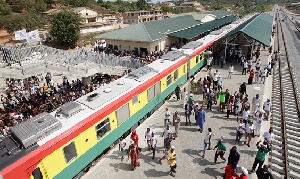None of Ghana’s commercial trains in operation are insured, TV3 can confirm.
This is because the laws establishing the motor vehicle insurance do not make it compulsory for commercial trains to be insured unlike commercial and private vehicles.
The Motor Vehicle Third Party Insurance Act (Act 42) of 1958 Motor Vehicles (Third Party Insurance) makes insurance of trains optional.
This means passengers who use the trains to commute from Tema to Accra and Nsawam to Accra daily risk their lives in the event of any injury in the event of any accident.
On Monday an Accra-bound train from Tema derailed at Tesano, injuring four persons who have since been treated and discharged.
Government announced Tuesday that it would pay for the medical bills of the victims of the accident but did not say if they will be given any compensation.
A three-member has meanwhile been set up to look into what caused the Accra-bound train from Tema to derail as well as make recommendations on how to prevent further future incidents.
Speaking to Wendy Laryea Tuesday on TV3 Midday Live Tuesday, Managing Director of GLICO, Alfred Yaw Ofori – Kuragu, confirmed the country’s trains have not been insured, though there are several insurance policies available for the railway sector.
“The insurance [for trains] is not compulsory apart from motor. It is now that the National Insurance Commission is trying to make other forms of insurance compulsory,” he stated.
Mr. Ofori-Kuragu said the insurance companies have policies for insuring train rail lines, the coaches of trains, the employees and even passengers “but unfortunately, they don’t have any insurance”.
He said he has engaged the Ghana Railways Company to insure its trains when the Accra-Tema rail line was opened, but “they always talk about funds; they don’t have money to pay trillions.
“I must say that if you’re in the train and you got injured then you have to go to the railway authorities for compensation because as for the insurance, it is not compulsory but the compensation is compulsory,” he explained.
Mr. Ofori-Kuragu said he has held discussions with the Minister of Railways and his deputies who have shown interest in ensruing that the trains are insured.
“I’ve had discussions with the Minister of Railways and his deputies and they are very keen on doing the insurance. They are looking for a facility to expand the rail lines and so that one no investor will put his money in if you don’t have insurance to support it,” he said.
General News of Tuesday, 24 October 2017
Source: 3news.com













